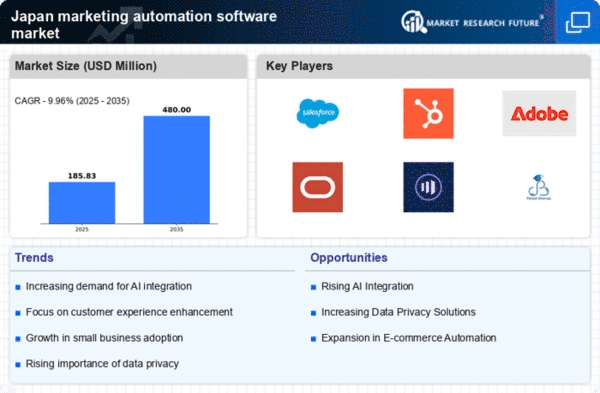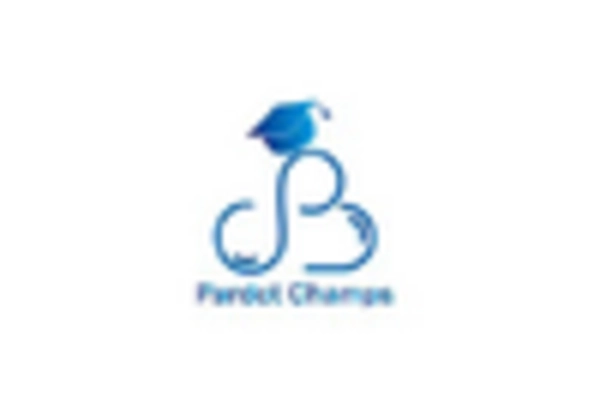Growth of E-commerce Platforms
The expansion of e-commerce platforms in Japan significantly influences the marketing automation-software market. With online shopping becoming increasingly prevalent, businesses are recognizing the necessity of integrating automation tools to streamline their marketing efforts. Data suggests that e-commerce sales in Japan reached approximately ¥19 trillion in 2025, highlighting the potential for automation software to enhance customer acquisition and retention strategies. By leveraging marketing automation, companies can optimize their online presence, manage customer interactions, and analyze purchasing behaviors, ultimately driving sales growth. This trend indicates a robust opportunity for marketing automation software providers to cater to the evolving needs of e-commerce businesses.
Focus on Customer Journey Mapping
The marketing automation-software market is increasingly characterized by a focus on customer journey mapping. Businesses in Japan are recognizing the importance of understanding the customer journey to enhance engagement and retention. By utilizing marketing automation tools, companies can visualize and analyze the various touchpoints in the customer experience. This approach allows for the identification of pain points and opportunities for improvement. Reports suggest that organizations that map customer journeys can achieve a 20% increase in customer satisfaction. Consequently, the demand for marketing automation software that offers robust journey mapping capabilities is likely to rise, as businesses seek to create seamless and personalized experiences for their customers.
Rising Adoption of Mobile Marketing
the marketing automation software market in Japan. is witnessing a rising adoption of mobile marketing strategies. With the proliferation of smartphones, businesses are increasingly focusing on mobile-optimized campaigns to reach consumers effectively. Data indicates that mobile commerce sales are projected to account for over 30% of total e-commerce sales in Japan by 2025. This shift necessitates the integration of marketing automation tools that can facilitate mobile engagement, such as SMS marketing and app notifications. As companies strive to enhance their mobile presence, the demand for marketing automation software that supports mobile marketing initiatives is likely to grow, presenting opportunities for software developers.
Increased Demand for Personalization
the marketing automation software market in Japan. experiences a notable surge in demand for personalized marketing solutions. As consumers increasingly expect tailored experiences, businesses are compelled to adopt automation tools that facilitate personalized communication. This trend is underscored by a report indicating that 80% of consumers are more likely to make a purchase when brands offer personalized experiences. Consequently, companies are investing in marketing automation software to analyze customer data and deliver targeted content, thereby enhancing engagement and conversion rates. The ability to segment audiences effectively and automate personalized campaigns is becoming a critical differentiator in the competitive landscape of the marketing automation-software market.
Emphasis on Analytics and Performance Measurement
In the marketing automation-software market, there is a growing emphasis on analytics and performance measurement. Businesses in Japan are increasingly seeking solutions that provide actionable insights into campaign effectiveness. The ability to track key performance indicators (KPIs) and analyze customer behavior is becoming essential for optimizing marketing strategies. Reports indicate that companies utilizing marketing automation tools experience a 14.5% increase in sales productivity. This trend suggests that organizations are prioritizing data-driven decision-making, leading to a heightened demand for sophisticated analytics features within marketing automation software. As a result, vendors are likely to enhance their offerings to meet these analytical needs.
















